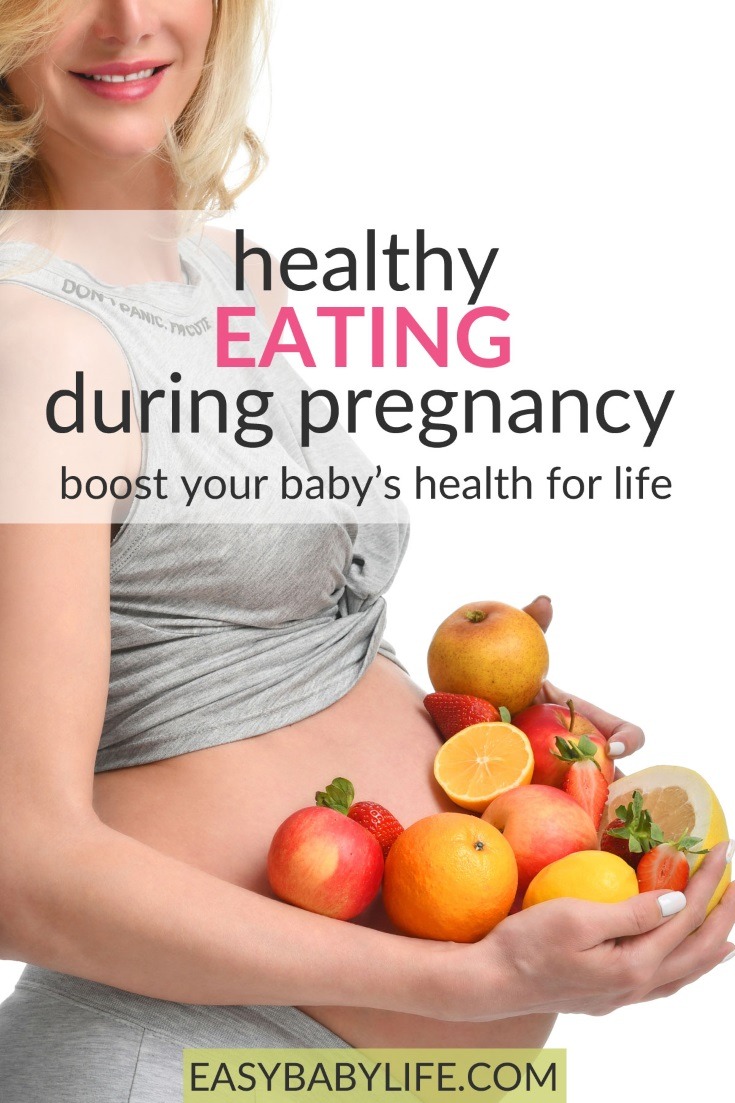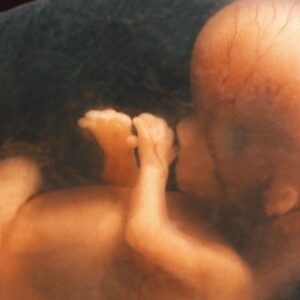What does healthy eating during pregnancy mean? And what benefits can it have?
You have probably heard that there are several foods that you should avoid during pregnancy since they may harm the fetus.
But in addition to avoiding certain foods, research is teaching us more and more about how we can adjust our diet to promote the future health of our baby-to-be.
Eating the right foods and in the right amounts during pregnancy can reduce the risk of several diseases (including heart disease and diabetes), not just for you but also for your child in the future.
Here, you’ll find detailed guidelines on what to eat, why, and what foods to avoid during pregnancy.
Guidelines For Healthy Eating During Pregnancy
In this article…
Benefits Of A Healthy Pregnancy Diet For Babies
During pregnancy, a mother’s body automatically adjusts to the nutritional needs of their unborn baby, giving the necessary building blocks for proper growth and development. Nearly every organ system plays its role in ensuring that the baby grows properly.
However, some nutrients aren’t simply enough to just come from the mom. She also needs her own set of nutrients to stay healthy. These would need to be supplemented through a proper diet. Let’s look at some important nutrients:
Iron
An important part of a baby’s growth inside the womb is the formation of blood vessels and red blood cells. After all, these carry oxygen throughout the child’s tiny body. By the end of pregnancy, a mother’s body may hold up to 30% more blood!
To help provide the optimum development of red blood cells in a baby’s growing body, a good amount of iron should be added to a mother’s diet.
Folic acid
Some mothers may not have enough natural stores of folic acid in their bodies. This is an important nutrient in the formation of a baby’s brain and spinal cord. Moms who do not have sufficient folic acid may give birth to babies with defects affecting the brain and the spine. Some other effects also include oral clefts and heart problems in newborns.
Typically, those who plan their pregnancy are often advised to drink folic acid a few weeks before conception.
Calcium and Vitamin D
Adults typically don’t take in as much calcium as we used to when we were little. But during pregnancy, this is one of the most important key ingredients in a growing baby. Calcium, with Vitamin D, are essential in bone, nerve, and heart development.
Lower risks of illness and birth defects
In addition to certain important nutrients, like those described above, the correct healthy eating during pregnancy will also lower the risks of several fetal developmental issues or even stillbirth. The list of foods to avoid is covered further down in the article.
So, a balanced diet is without any doubt what your baby needs. And what is that? Just a second and I’ll let you know. But first, let’s also take a look at the health effects for mom by eating healthy during pregnancy.
Benefits Of A Healthy Pregnancy Diet For Moms
For moms, there are also several nice benefits from eating healthy during pregnancy. For example, a lower risk of pregnancy diabetes (called gestational diabetes), a lower risk of extreme weight increase, and a lower risk of high blood pressure (possibly leading to pre-eclampsia).
Good reasons, don’t you think? Let’s discuss them in some more detail:
Prevent gestational diabetes
Gestational diabetes mellitus (also known as GDM) is a medical condition wherein blood sugar levels become too high in a pregnant woman. Some of the risk factors of gestational diabetes include a high sugar and fat intake in one’s diet. This condition has been linked to moms who have higher body weight or BMI.
GDM may affect how a child develops in their mother’s womb. There is a risk for heart problems, an excessively high birth weight, low blood sugar levels, and even stillbirths in babies whose mothers have GDM.
By eating healthy, you can make sure that your total intake of sugar and fat doesn’t go beyond what is needed by you and your baby.
Prevent excessive weight gain
In all their excitement (or stress) during pregnancy, some moms may forget to watch what they eat and how much of it they do eat. It’s healthy to gain weight during pregnancy (you definitely should gain some!), but there’s always a threshold to how much weight you can put on.
One recent study shows that pregnant women who gain too much weight during pregnancy are at risk for elevated blood pressure levels, prematurely rupturing their bag of water, chorioamnionitis (a maternal infection that can affect the newborn), and cesarean delivery.
Prevent high blood pressure (pre-eclampsia)
No one knows exactly what causes pre-eclampsia, but there is some research indicating that a poor, low-nutrition diet is part of the problem, so take it seriously. Pre-eclampsia is a serious condition that can cause severe complications for both the mother and baby.
A healthy diet packed with key essential nutrients may help prevent or treat pre-eclampsia.
What To Eat To Boost the Future Health Of Your Baby
Ok, so healthy eating during pregnancy is obviously key for both mom and baby. But what does it mean? A lot of studies mention “a balanced diet” without really specifying what it is.
I guess anyone can figure out that a healthy diet will not comprise of chocolate bars and French fries, but is avoiding sugar and poor fats enough?
Not really, but it will get you a long way.
Pregnant moms should follow the “eatwell” plate. It consists of 5 main food groups in their proper proportion on a plate. This includes:
Fruits and Vegetables
This is one of the healthiest food groups; therefore, moms should prioritize fruits and veggies! The benefits of eating fruits and vegetables include vitamins, minerals, and fiber. Mothers can take as much as five portions per day. Make sure to wash these foods properly, and avoid cooking to retain the nutrients.
Carbohydrates
Of course, moms can’t avoid carbohydrates at all! They need this not just for energy, as some sources also contain fiber and even vitamins. Mothers can take around three portions per day.
Some examples of carbohydrates include wholegrain cereals or bread, pasta, rice, potatoes, corn, and rice.
Dairy
Calcium is an important building block of bones. Your growing, unborn child will definitely need it. Besides calcium, dairy products also contain protein and other minerals essential for babies’ growth. Pregnant mothers can take two to three portions of dairy per day.
Good sources of this particular food group are milk, yogurt, and pasteurized cheeses.
Meat and Other Proteins
Protein is essential to a pregnant woman’s diet. You can eat meat, fish, or vegetable protein for every meal of the day, but be sure to take it moderately. Oily fish, like salmon and mackerel, should only be eaten a maximum of 2 portions per week.
Lean meat, fish, eggs, nuts, and beans are excellent sources of protein. Make sure they are cooked well.
High-Sugar or High-Fat Foods
Moms can still occasionally indulge in their favorite chocolate, biscuits, pastries, and puddings, but only small portions are advised during pregnancy because of the risk of weight gain, heart disease, and even tooth decay.
High-quality fats are not a problem unless you have weight issues that make you want to restrict your calorie intake.
If you avoid refined sugar, artificial sweeteners, and poor fats as much as you can, and focus on filling up your body with vitamins, antioxidants, minerals, healthy fats (like in fatty fish and avocado), slow carbs (like in whole grains), healthy proteins (like in fish, eggs, and white meat) you will give your baby a great start.
Avoid Alcohol and Minimize Caffeine Intake
Also, avoid alcohol and minimize your intake of caffeine. The latter can cause an increased risk of miscarriage, according to several studies.
Get Enough Vitamin D
Finally, make sure you get enough vitamin D. A study from 2007 concluded that women who were deficient in this key fat-soluble vitamin were significantly more likely to develop pre-eclampsia and the dangerous symptoms associated with it.
Take supplements, enjoy daylight outside as much as possible, and eat foods that are high in vitamin D, such as fortified milk or soymilk, and cultured dairy products like cheese and yogurt.
Fatty fish species like salmon and herring also offer significant amounts of vitamin D – plus an omega-3 boost that can enhance a baby’s brain and prevent postpartum depression.
Rules of thumb for safe and healthy eating while pregnant
Still too complicated? All this can be boiled down to 10 bullet points.
Here are the rules of thumb for safe and healthy eating while pregnant:
1. Eat veggies and fruits of different colors every day.
2. Eat fish, eggs and/or white meat every day (except for oily fish – only twice a week!).
3. Eat whole-grain products (bread, pasta, rice, quinoa, bulgur, et cetera) every day.
4. Eat candy, cookies, soft drinks, and similar sugar-intense products only once per week, and in small amounts only.
5. Drink no more than 1 cup of coffee and/or caffeinated drink every day, or even avoid it altogether(8).
6. Take high-quality prenatal multivitamins.
7. You may also take prenatal DHA fish oil supplements.
8. Make sure you get enough sunlight exposure or take a Vitamin D supplement every day.
9. Avoid alcohol completely.
10. Avoid artificial sweeteners completely (if you absolutely must sweeten something, try Agave nectar.)
Done!
Eating The Right Amount of Food
Risks if mom overeats
A recent study has shown that an unbalanced diet during pregnancy can increase the baby’s risk of type 2 diabetes later in life, something that in turn increases the risk of heart disease. Moms with a high-fat diet has also been seen to increase the risk of congenital heart disease. So by eating healthy, you will decrease your baby’s risk of diabetes later in life as well as heart disease.
Research has also demonstrated that the children of mothers who overeat are at risk for liver and pancreatic damage, both of which can contribute to early-onset obesity and, again – diabetes. In addition, significant brain changes can occur in the offspring of some mothers who overeat. These changes take place in the hypothalamus, the region of the brain that controls weight regulation. The data suggest that children born to mothers who eat a high-fat diet may be predisposed to weight problems.
New research at the University of Auckland, New Zealand, has revealed that a pregnant mom’s cravings for sweet food during pregnancy seem to affect unborn female babies more than it would affect males. Eating too much sugar during pregnancy can harm the nutrients that reach unborn female children and possibly affect their growth later in life.
Risks from eating too little
But just as over-eating can be harmful, so can eating too little. Findings of a new US study have proposed that intake of a low-calorie diet or diet low on nutrient content may harm the brain of newborns; after birth, affected children may develop behavioral disorders in later life.
It is also linked with low intelligence quotient (IQ) in kids.
Foods To Avoid During Pregnancy
Is that all? Well, almost. You also need to keep an eye on what foods you need to avoid during pregnancy because they may harm fetal development for various reasons.
Here are the foods to avoid during pregnancy:
Raw meat
Consuming inadequately cooked meat can lead to contamination with coliform bacteria, toxoplasmosis, and salmonella. For pregnant women, meat should not be eaten if it is raw or cooked rare. Toxoplasmosis, caused by a parasite, can, in the worst-case scenario, lead to stillbirth, long-term structural and neurological damage, and other devastating effects.
But be cooked to a temperature of 160 degrees Fahrenheit, or 180 degrees F, in the thigh for whole poultry.
Game meats, liver and liver products, and pâté should also be avoided. Liver is a rich source of vitamin A, which may be high enough to be toxic to an unborn child.
Raw fish
It’s okay to eat raw fish, but this should be frozen for at least 72 hours before being eaten.
One exception is raw shellfish – this is not allowed for pregnant women.
Fish from contaminated waters
Some lakes and rivers may be contaminated with polychlorinated biphenyls, which may lead to lower birth weight and smaller head circumference. These are commonly oily fish, like salmon or trout. When purchasing these items, make sure to do some research first on where these fish were caught.
Fish high in mercury
Make sure you avoid fish with high mercury content, such as tuna. This can lead to developmental delays in children. Other examples are grouper, marlin, orange roughy, tilefish, swordfish, shark, and king mackerel.
Unwashed vegetables and fruits
Unwashed fruits and veggies may have traces of soil particles, bacteria, or pesticides. Toxoplasmosis can again be acquired from this, which in the worst case, can lead to stillbirth, long-term structural and neurological damage, and other devastating effects. Wash or peel your veggies and fruits!
Unpasteurized milk and cheese
The pasteurization process for milk and cheese kills unwanted microorganisms that can cause gastrointestinal infections or spoil the food products. Unpasteurized milk and cheese may contain listeria, which may further lead to miscarriage.
Raw eggs
Raw hen, duck, goose or quail eggs can contain salmonella, a common cause of bacterial food poisoning. Raw egg whites are high in avidin, a protein that inhibits the absorption of important proteins from food. Pregnant women need to be able to absorb as much protein as possible, especially for their babies. This is one big reason why raw eggs should be avoided.
If you want, you can download a practical printable version of this list here:
(And again, alcohol and any other drugs and artificial sweeteners should certainly always be avoided, as mentioned above.)
This was all! Quite a lot to digest, maybe. The MOST important thing is to avoid any foods that can be harmful to your baby, but boosting your baby’s health is nice too.
Have a wonderful pregnancy, and post a comment below if you wonder about anything!
Read Next
- Why Such Weight Gain During Pregnancy? Here are the Reasons!
- 8 Normal Breast Changes During Pregnancy and Beyond and Why They Occur
- 3 Cool Benefits Of Morning Sickness (So Keep Your Spirits Up, Mom!)
Research References
- Physiology, Maternal Blood
- Prevention of congenital malformations and other adverse pregnancy outcomes with 4.0 mg of folic acid
- Predictive and diagnostic biomarkers for gestational diabetes and its associated metabolic and cardiovascular diseases
- Association between gestational weight gain and severe adverse birth outcomes in Washington State, US
- The association between dietary factors and gestational hypertension and pre-eclampsia: a systematic review
- Maternal caffeine consumption and pregnancy outcomes: a narrative review with implications for advice to mothers and mothers-to-be
- The Journal of Clinical Endocrinology. ‘Maternal vitamin D deficiency increases the risk of preeclampsia
- Maternal diet and genes interact to affect heart development
- Prenatal exposure to polychlorinated biphenyls and fetal growth in British girls

Paula Dennholt founded Easy Baby Life in 2006 and has been a passionate parenting and pregnancy writer since then. Her parenting approach and writing are based on studies in cognitive-behavioral models and therapy for children and her experience as a mother and stepmother. Life as a parent has convinced her of how crucial it is to put relationships before rules. She strongly believes in positive parenting and a science-based approach.
Paula cooperates with a team of pediatricians who assist in reviewing and writing articles.








very well explained…
Hi there
It;s a great post in fact, specially for me now. My wife have conceived recently, I am actually searching a good advice of her. In this respect the post will be helpful for me. One more thing I would like to know that she is in the of 5 weeks and in this stage is she need any physical exercise for better physical condition.
Thanks for the helpful post.
Hi,
Congratulations and how nice of you to want to help her. :-) At 5 weeks pregnant, pregnancy hormones are basically exploding, so she might be anything from just as usual to extremely tired, nauseated, starving, moody and you name it. If she can (continue) being active in any way she usually is, then that’s great, but if she can’t right now, then that’s fine too. A lot of women basically sleep through the first two months of pregnancy – they fall asleep on the couch at 7 pm. This will pass, as will most other awkward pregnancy symptoms and at around 3-4 months pregnant, many women feel great and can enjoy exercising. If your wife remains healthy and does not have a high-risk pregnancy, she can exercise almost as usual until the baby belly will obviously stop her. Heavy lifting is not recommended late in pregnancy, and also, of course, fighting sports and similar. Walking and walking usually work for a long time during pregnancy, and prenatal yoga is great from around month 5.
But again this these first months can be really tough and if they are, exercising might be the last thing on her mind. If she is ok, she can continue with her normal ways of exercising or start with for example power walks or walks together with you discussing your new situation is a good option. :-)
Hope this helps,
Thank you very much.